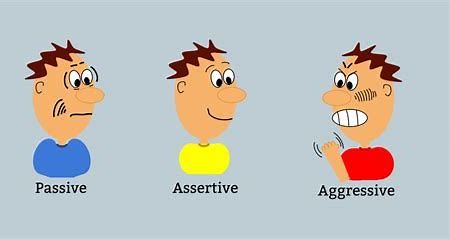I've discovered assertive conversation
that follows listening works.
It helps me as a chaplain, care pastor and a man
relate confidently while living in a angry world.

There have been a lot of questions these days about how to talk to each other, especially when we disagree.
There are many sad examples of how not to.
In Speaking the Truth In Love--How to Be An Assertive Christian , Ruth Koch and Kenneth Haugk of Stephen Ministry, identify the four main patterns of conversation--passive, aggressive, passive/aggression and assertive. They also identify the benefits of getting it right and the consequences of doing it wrong.
This book is part of the Stephen Minister training materials for how to walk alongside people in a crisis and how to effectively care for them. Care skills are needed today more than ever and in every area of life, including politics and sexuality.
"Passive Behavior is behavior that moves against the self.
Passive behavior says, 'I'll give up anything to avoid displeasure and to gain approval.' Passive people frequently give up important parts of their own personalities to avoid disapproval or criticism so others will like them." (p. 16)
"Aggressive Behavior is behavior that moves against others.
Aggressive behavior says, 'I have the right to patronize you, put you down, dominate you, or humiliate you in order to get what I want.' The aggressive person has low internal restraints and recognizes few external limits." (p. 19)
"Passive Aggression is a subtle kind of aggression, an underhanded way of moving against another person or manipulating others to get one's own way. Those who use passive aggression... use undercover means to get their way, to get even and to express what they're not willing to say in a straightforward manner." (p. 22)
"Assertive behavior is behavior that honors the self while honoring others. The assertive person authentically cares for others and at the same time engages in God-pleasing self care." (p. 23)
Often these days I prefer to say nothing until I get the opportunity to say it the way I mean it. I want to avoid an argument but I don't want to say something I don't mean so someone likes or approves of me even if we disagree.
Grace makes it possible to disagree with someone but approve of them as a person, hear their story and discover why they believe the way they do.
"I'm not here to argue or convert you. I'm here to listen to you. I'm here to have a conversation."
That quote from Carl McColeman, can be very useful.
I've discovered assertive conversation that follows listening works. It helps me as a chaplain, care pastor and a man relate confidently in an angry world.
I don't compromise what I believe but neither do I force others to agree with me. It is a pattern that, often, stimulates others to be interested in my opinion. That's the only times it is worth sharing.
Care ministry's emphasis on honoring people with presence, listening by asking open-ended questions and learning their story prove to be the Biblical way and most effective method to relate. I'm happiest, most confident and strongest when I'm practicing assertiveness.
Then we can talk about our differences, expand our souls and discover solutions that are bigger than any one idea or person.











